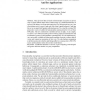Free Online Productivity Tools
i2Speak
i2Symbol
i2OCR
iTex2Img
iWeb2Print
iWeb2Shot
i2Type
iPdf2Split
iPdf2Merge
i2Bopomofo
i2Arabic
i2Style
i2Image
i2PDF
iLatex2Rtf
Sci2ools
116
click to vote
ACNS
2007
Springer
2007
Springer
A New Protocol for Conditional Disclosure of Secrets and Its Applications
Many protocols that are based on homomorphic encryption are private only if a client submits inputs from a limited range S. Conditional disclosure of secrets (CDS) helps to overcome this restriction. In a CDS protocol for a set S, the client obtains server’s secret if and only if the client’s inputs belong to S and thus the server can guard itself against malformed queries. We extend the existing CDS protocols to work over additively homomorphic cryptosystems for every set from NP/poly. The new construction is modular and easy to apply. As an example, we derive a new oblivious transfer protocol with log-squared communication and a millionaire’s protocol with logarithmic communication. We also implement private, universally verifiable and robust multi-candidate electronic voting so that all voters only transmit an encryption of their vote. The only hardness assumption in all these protocols is that the underlying public-key cryptosystem is IND-CPA secure and the plaintext order d...
Related Content
| Added | 06 Jun 2010 |
| Updated | 06 Jun 2010 |
| Type | Conference |
| Year | 2007 |
| Where | ACNS |
| Authors | Sven Laur, Helger Lipmaa |
Comments (0)

